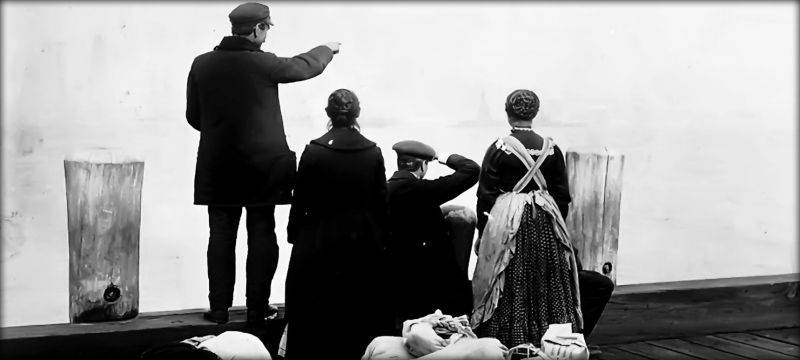Migrants of Yesterday and today
We live in a globalized world where the means of transport and communications have profoundly facilitated the mobility of many people. The history teaches us to observe the phenomenon of migration as the engine able to put in motion deep changes.
Human beings are at the core of this analysis. The cause of the migration is often to be found in the arduous and tormented decision to leave one’s country in search for hopes of better living conditions. Unfortunately, restrictive laws and the lack of an adequate protection for the fundamental rights of migrants make this choice even more complex.
In addition to the unremitting difficulties presented in the form of the legal system, a greater and perhaps more subtle obstacle materializes once the migrant settles in his new home.
The interconnections of culture and social class act in such a way to create a deep and silent social exclusion for the newly arrived residents, whose different background can often be the cause of stiff incomprehension. Being able to foster politics engendering the possibility of a true freedom of movement would be conducive to a rethinking upon the social and psychological condition of the migrant, whose reasons to leave are to be traced in the hopes of a decent life, often hard to find in his or her native country.
i-Italy met with Professor Anthony Julian Tamburri, Dean of the John D. Calandra Italian American Institute, to talk about his participation at the conference of the United Nation the 18 of December. The other panelists will be Richard Alba, Professor of Sociology at the Graduate Center, CUNY, Roland Shatz, Founder and CEO of Media Tenor International, Bela Hovy, Chief of Migration Section DESA and the tenor Luciano Lamonarca. The moderator will be Maher Nasser, Director of Outreach Division. DPI.
How relevant is it to talk about the issue of migration, especially after the financial crisis of 2008?
It’s extremely important in the Italian social context for a number of reasons. In my view, Italy has yet to come to terms with his migratory history. It’s obvious when we observe the behavior of the Italian newspapers when they come to America. Even though they have had their offices here for a long time, they never address the Italian American community and their roots. In 2008, the City of New York declared the Italian language as one of its mandatory languages, if somebody asks for information in Italian. This was a very significant milestone for the Italian history in the United States. One of the reasons why it is relevant to speak about migration, specifically in the Italian case, is the staggering unemployment of Italy’s youth that accounts for 40%, while, on the other hand, perks and benefits of politicians remain high. Another factor to take into account is the still existing discrimination of Southern Italians perpetrated by Northern Italians.
I’d like to think through parallels between the case of France and writers such as Albert Camus and Frantz Fanon. Even though they were Algerian French, France made claims about their literature and they are identified as French authors. Why does Italy not engage this issue by reclaiming the literature of the Italians of America?
That was the mistake. Scholars of American Studies don’t make references to the Italian American literature; African-American, Asian American, Hispanic and Native American literatures are the categories often taken into consideration, even through Don DeLillo and John Fante are still thought of as some of the most famous and important American writers of Italian origins. The only tool available to comprehend this "vociferous silence" is to think about the fact that these scholars pay particular attention to studies in British literature. We need to go back to sociology in the 1960s, such as Herbert Gans, to have a little recognition of Italian American history. There are still few and insufficient studies related to this type of analysis.
The problem of migrants is a poignant one, because often the most of them have those kind of underpaid jobs which often citizens would not accept. What is the relationship with the citizenship?
The debate is strictly economic. When two years ago in Arizona laws on migratory fluxes were made more rigid, companies risked losing part of their labor pool. For this reason the governor made the legislation more flexible. Fifty years ago, when a company made a 35-40% profit, this almost represented an ideal situation. Today if a factory doesn’t make a 100% profit, it fails. Another relevant issue to be raised is the gap between the salary of the worker and the employer, there is a very high discrepancy between these two figures.
The law on migratory fluxes, especially after September 11th, has become more rigid to hinder mobility in this time of crisis. Is it necessary to create a new legislation to defend migrants’ rights?
From my perspective it is very difficult, in terms of Universities especially, both from the point of view of the students who want to study abroad here in the US and from the professional point of view for those who want to work in academia. After all, human being is full of contradictions. It’s still unsettling to think about the idea of death penalty, for example. I think we should be able to engender a different and more permissive legislation.





































i-Italy
Facebook
Google+
This work may not be reproduced, in whole or in part, without prior written permission.
Questo lavoro non può essere riprodotto, in tutto o in parte, senza permesso scritto.